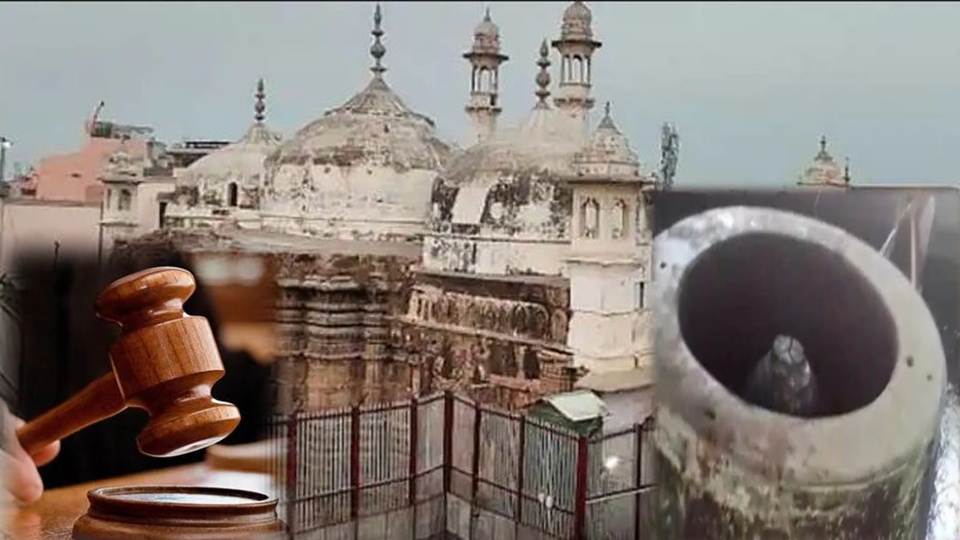Gyanvapi Case: It is rare that when an act is passed, it is tough to repeal it. People engaged in drafting the act do not want to look back and analyse their fault lines. But it should not be the reason to harm the interests of nearly 1 billion people. The Gyanvapi case provides us with one such opportunity.
SC order on Gyanvapi case
Hindus in the country have received one more respite from the country’s highest court of the land. For a few more months, the area of Shivling discovered in the Gyanvapi Masjid will remain under protection. It means that, just as they destroyed thousands of Mandirs in pre- 1947 India, Islamists cannot do the same to the holy Shivling. It will be protected by the government under the orders of the Supreme Court Bench, comprising Chief Justice D.Y. Chandrachud, Justice Surya Kant, and Justice PS Narasimha.
The Shivling was found out in a video survey directed by a lower Court. Five Hindu women had approached the court seeking permission to worship Hindu deities inside the Masjid Premise. They had also sought orders directing the Masjid Management Committee not to destroy the murtis. The court had ordered a video survey to determine the historical legacy of the Masjid. The other party claims that it is not a shivling but instead a wazoo khana.
Also read: A bhavya Vishwanath Mandir including the Gyanvapi complex in less than 3 years is on the card
Two more cases in the same Masjid
On May 16, Varanasi Court sealed the area after a dispute about the structure came to the forefront. On the very next day, the Supreme Court said that the sealing of the area does not mean that Muslims can’t offer Namaz inside the premises. The obvious question is: what about the rights of Hindus to worship? It will be answered by a fast-track court on November 14, the birthday of India’s most secular prime minister.
Meanwhile, another case about the Gyanvapi Masjid is being heard in the Allahabad High Court. In 1991, local Hindu pujaris requested permission to worship in the premises of Masjid. The High Court had suspended the hearing.
Three decades later, the Varanasi Civil Court ordered a survey by the Archaeological Survey of India (ASI). It was supposed to determine whether the mosque was built by razing a mandir. In September 2021, the Allahabad High Court put a stay on the survey. On November 28 of this year, the Honourable Court will hear final arguments in the matter.
Also read: Gyanvapi thieves are the stupidest morons in the history of mankind
The Place of Worship Act needs to go
At the centre of all these cases all across India lies an act called the Places of Worship Act, 1991. Right from the day it was presented in Parliament, it was an anti-Hindu act. By passing the act, P V Narasimha Rao wished to ensure that the Hindus do not get united and start to claim ownership of 40,000 mosques built on the ruins of Hindu mandirs. He had seen how much Hindus were devoted to Ram Mandir, and that is why he kept Ram Janmabhoomi out of the purview of this act.
The act effectively says that whatever religious identity a place had in 1947 will be its constitutionally legitimate identity. In essence, it says that holy places in India did not have any identity before our independence. Basically, it says that history does not matter for the future course of civilization’s journey.
Also read: Liberals and Islamists cry like dying goats over Gyanvapi Shivling discovery
In a way, this is anti-Constitutional in itself. Because the Constitution acknowledges the thousands of year’s long journey of Indic civilization, it legitimises the existence of Hindus alongside their Abrahamic invaders in the last two millennia. That is why, numerically, minority religions have special protection.
It does not mean that the majority can’t even claim their rights to their places of worship. But the Places of Worship Act is contrary to its name for Hindus. A petition to repeal it is in the Supreme Court. Hopefully, it gets a quick listing after the Gyanvapi Case.
Support TFI:
Support us to strengthen the ‘Right’ ideology of cultural nationalism by purchasing the best quality garments from TFI-STORE.COM
